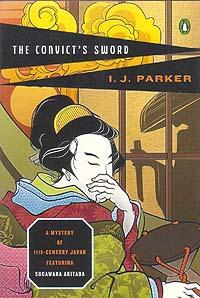| 2010 Review by Mike Street - Special to THE ASIAN REPORTER
- The Convict’s Sword - by I.J. Parker. Penguin Books, 2009
In the pantheon of mystery books, I.J. Parker’s stand alone. Far from
simple potboilers, her mysteries weave multiple plot threads into a lush
tapestry of Japanese society in the Heian period. Her latest book, The
Convict’s Sword, features her detective, the judicial clerk Akitada
Sugawara, trying to clear the names of two friends, even as he makes
decisions about his family more serious than he ever imagined. The
result is one of her best — if not the best — books yet, a complex and
heady mix of suspense and Asian culture written with authority and
flair.
Sugawara’s unconventional approach to life often gets him into
trouble, chafing with his superiors when he ignores his menial
bureaucratic duties in order to pursue justice. This forms one of the
central conflicts in The Convict’s Sword, in a pursuit carried over from
Parker’s last book, Island of Exiles. In that book, Sugawara promised to
clear the name of his wrongly imprisoned friend Haseo, who died helping
him uncover a vast corruption scheme on the penal colony at Sado Island.
This shows two more strengths of Parker’s books: The storylines are
continuous, and no character is safe from disaster. Throughout the
series, Sugawara’s circle of friends and family has grown and shrunk,
making Parker’s books both satisfying and unexpected, as readers follow
his rise through the government ranks without ever being sure of what
might happen.
And Sugawara’s rise has never been smooth; he is currently harassed
by his superior, Soga, who sees him as incompetent and irresponsible.
When he is away from his office solving Haseo’s mystery, Soga sees the
chance he needs to remove him from his position. But just as this
occupational disaster is about to befall Sugawara, the scheme is delayed
when a panic over a supposed smallpox epidemic drives Soga and his
family from the city.
Sugawara and his family remain in the capital in spite of protests by
his wife Tamako, partly because he doesn’t believe the panic, and partly
because he has plenty to do. Not only must he explore Haseo’s family
tree further, but he must also prove the innocence of his retainer, Tora,
accused of murder. The victim, a blind street singer named Tomoe, was
not only Tora’s friend but also was apparently hiding important secrets
of her own.
Released to help prove his innocence, Tora becomes involved with a
local gang while pursuing a man who resembles Haseo and seems to be
involved in Tomoe’s death. And Sugawara’s marriage becomes threatened by
both the smallpox scare and a beautiful woman he meets in the course of
his investigations. Thanks to Parker’s unpredictability, we keep
reading, never sure if the next moment will be Tora’s last, if Sugawara
will lose his wife or his family, or if all of these will happen.
During the investigations, we find a Heian-era Japan that is not so
different from our modern world. The bureaucracy is slow and entrenched
in its positions while the police struggle to prevent crime due to
insufficient resources. Sugawara’s well-intended efforts to bring this
deficiency to the attention of the crown endanger his friendship with an
important official. His negotiations of the byzantine machinations of
the government hierarchy and the maze of political connections will be
familiar to those who have ever stood in line at the DMV or tried to
rectify an error on their taxes.
Yet Parker’s characters always have room for growth, and Sugawara is
changed in many ways by the events of the book, especially his attitude
toward his relatively progressive marriage. Trying to assert his
masculine authority creates a rift between him and his beloved Tamako,
and their marriage becomes what it had never been: a cold, businesslike
arrangement. Struggling to right this error gives Sugawara new insight
into his ideals and the importance of his family.
As ever, Parker juggles the multiple plots at a page- turning pace
that still allows time to savor the many cultural pleasures within the
book. Mystery readers can appreciate the book’s whodunit aspect, but
it’s not Parker’s style to leave you slapping your forehead at an
obvious clue that you missed. She exhibits masterful control of all
aspects of the book, and it’s always a comfort to remain in her thrall,
the only disappointment when you reach the end and wonder when the next
book is coming.
Parker is sure to bring in new readers with this excellent addition
to the Sugawara story. Those who are unfamiliar with her detective or
the time he lives in will find more information in her Historical Note
at the end, which details the finer points of Heian-era Japanese life as
they relate to the book and cites sources for those who might want to
read more. But it’s hard to imagine a better guide to this time in
ancient Japan than I.J. Parker’s wonderful Sugawara novels, which just
keep getting better and better.
|

